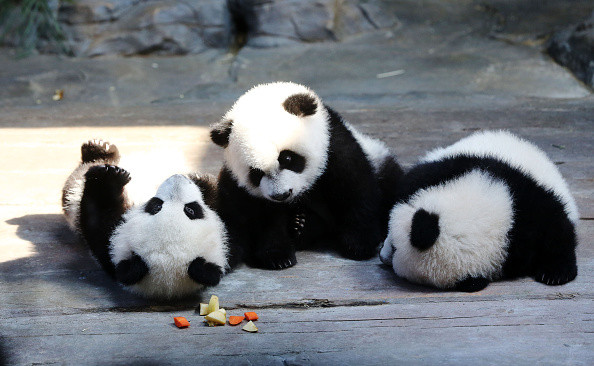Pandas unable to fully digest their favourite food bamboo say scientists

After spending nearly a lifetime munching on bamboo, scientists in China have discovered the giant pandas' gut bacteria is unable fully to digest the plant.
In a study that examined some 45 captive pandas over a year, pandas' digestive system was found to be, "entirely differentiated from other herbivores".
Calling the discovery an "evolutionary dilemma" for the animals, scientists found the pandas retained the gut bacteria of the omnivorous bears that they had evolved from that ate both plants and meat.
"Unlike other herbivores that have successfully evolved anatomically specialized digestive systems to efficiently deconstruct fibrous plant matter, the giant panda still retains a gastrointestinal tract typical of carnivores," said the study's summary, reported AFP News.
The findings "may adversely influence the co-evolutionary fitness of this herbivore", said the report.
'Evolutionary dilemma'
The study's co-author Xiaoyan Pang from Shanghai Jiao Tong University said: "This result is unexpected and quite interesting, because it implies the giant panda's gut microbiota may not have well adapted to its unique diet, and places pandas at an evolutionary dilemma."
Unlike other plant-eating animals that have successfully evolved anatomically specialised digestive systems to effectively deconstruct fibrous plant matter, the giant panda still retains a gastrointestinal tract typical of carnivores. This combined scenario may have increased their risk of extinction.
Pandas are believed to have spent about two million years exclusively munching on roughly 12.5kg of bamboo stems and leaves for up to 14 hours per day. However, they digest only roughly 17% of the consumed plant.
Pandas are presently suffering due to a habitat loss with their natural habit being the mountains in south western China.
Their low reproductive rate adds to the risk of their extinction and with less than 2,500 pandas left in the wild, the animals have made it to red list of threatened species on the IUCN's (International Union for Conservation of Nature).
A research team member, Dr. Zhihe Zhang, from the Chengdu Research Base of Giant Panda Breeding in China, said: "Unlike other plant-eating animals that have successfully evolved anatomically specialised digestive systems to effectively deconstruct fibrous plant matter, the giant panda still retains a gastrointestinal tract typical of carnivores.
"This combined scenario may have increased their risk of extinction."
The findings are published in mBio –an online journal published by the American Society for Microbiology.
© Copyright IBTimes 2025. All rights reserved.





















